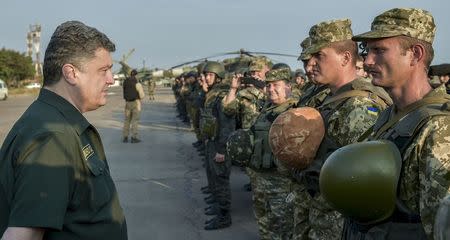Ukraine's leader sees no military solution of crisis, vows reforms

By Gareth Jones and Pavel Polityuk KIEV (Reuters) - Ukraine's president said on Friday there could be no military solution to his country's crisis and said he hoped "a very fragile" ceasefire in the east would hold, allowing him to focus on rebuilding the shattered economy. Petro Poroshenko also said a new wave of European Union sanctions against Russia underlined Western solidarity with Kiev, and that the Ukrainian and EU parliaments could both ratify a deal on closer economic and political ties on Sept. 16. Russian President Vladimir Putin, who denies Western and Ukrainian accusations that he is fuelling the conflict, said the new sanctions were aimed at disrupting the peace process. Washington also expanded its own sanctions on Friday. Ukrainian forces have been battling pro-Russian separatists in eastern Ukraine for five months in a conflict in which more than 3,000 people have been killed. The two sides have been broadly observing a ceasefire since last Friday, despite sporadic violations. "There is no military solution for this crisis," Poroshenko told EU and Ukrainian lawmakers and businessmen at the annual Yalta European Strategy conference - held in Kiev, not Yalta, due to Moscow's annexation of Ukraine's Crimea region in March. "I hope the very fragile but efficient peace process which started exactly one week ago will have a continuation, for the (sake of) stable peace and security on the continent," he said, speaking in English. Poroshenko said Ukraine's "association agreement" on closer EU ties, due to be ratified next week, provided a road map for the reforms that he said would be a priority after a parliamentary election on Oct. 26, provided that peace held in the east. But he stressed national security had to come first. "Investors will come when they feel safe in this country. That is why we are reforming the very ineffective security system and army, our court system ... If we do not reform these things, even after the war, investors won't come," he said. "I know personally how harmful the state can be for the investment climate," added Poroshenko, a billionaire former businessman once nicknamed the "Chocolate King" for making his fortune in confectionery. Ukrainian military spokesman Andriy Lysenko, citing government data, said the conflict in eastern Ukraine had so far cost around 1 billion dollars. Another government official said at least 270,000 people had been displaced by the war. EXCHANGE OF PRISONERS Eastern Ukraine has been largely quiet in recent days, and the tension following the ceasefire has gradually eased. Overnight into Friday, Ukrainian forces and the separatists each handed over 37 prisoners-of-war at a site north of the rebel-held city of Donetsk. The exchange of all captives is one of the key elements of the ceasefire. Interfax news agency quoted Andrei Purgin, "deputy prime minister" of the self-proclaimed "Donetsk People's Republic", as saying the next exchange would take place on Sunday. But Purgin also repeated the rebels' position that the regions they control would not be reunited with Ukraine. "We will not be in a unitary, federal Ukraine ... We can preserve some economic model which allows us not to break the tie with the rest of Ukraine or to keep some socio-cultural connections ... We have earned with our blood the right to do this," he told Reuters. Poroshenko said Kiev could only offer them some autonomy. "To keep the country united, we need some decentralisation of power ... The key issues of security, foreign policy, strategic points of development must be in the hands of the central power," he told the conference in Kiev. The crisis in Ukraine erupted late last year when Poroshenko's Moscow-backed predecessor, Viktor Yanukovich, rejected the association agreement with the EU and sought closer economic ties with Ukraine's communist-era overlord, Russia. His decision triggered mass anti-government protests in Kiev that culminated in Yanukovich's flight to Russia. Moscow then seized Crimea and the separatist revolt in mainly Russian-speaking, heavily industrialised east Ukraine erupted in April. Kiev and its Western backers accuse Russia of arming the rebels and sending forces into Ukraine and say this is proved by evidence they have provided, but Russia denies the accusation. In talks in Kiev on Friday on the new association agreement, Poroshenko asked the visiting head of the European Commission, Jose Manuel Barroso, to consider allowing Ukraine to delay the lowering of customs tariffs on EU imports, Interfax reported. It gave no reason for the request, which may reflect Ukrainian concerns about the uncompetitive ness of its industry. Kiev may also have been perturbed by Russian reports that Moscow will introduce import tariffs on Ukrainian goods from Nov. 1 if it presses ahead with the association accord with the EU. The new wave of EU sanctions against Russia that came into force on Friday ban financing for some Russian state-owned firms and impose asset freezes against more Russian politicians. Welcoming the new sanctions as well as the pledges of support he received at a NATO summit last week, Poroshenko said: "I never felt before this level of solidarity ... I feel myself a full member of the European family." (Additional reporting by Anton Zverev in Yasinovataya; Writing by Gareth Jones; Editing by Alison Williams)

